Fermenting foods is one of my favorite pastimes, and I’ve been especially fond of naturally fermented sodas recently. This fermented turmeric soda I made recently really got me hooked! They are so easy to make and can be flavored any way you like, plus they are actually good for you. I had heard of sweet potato kvass (also called sweet potato fly) before and had been wanting to try it for some time, as I absolutely love sweet potatoes. So when I got the chance to look over Shannon Stronger’s new book Traditionally Fermented Foods, I knew that I had to make the fermented sweet potato kvass recipe right away!
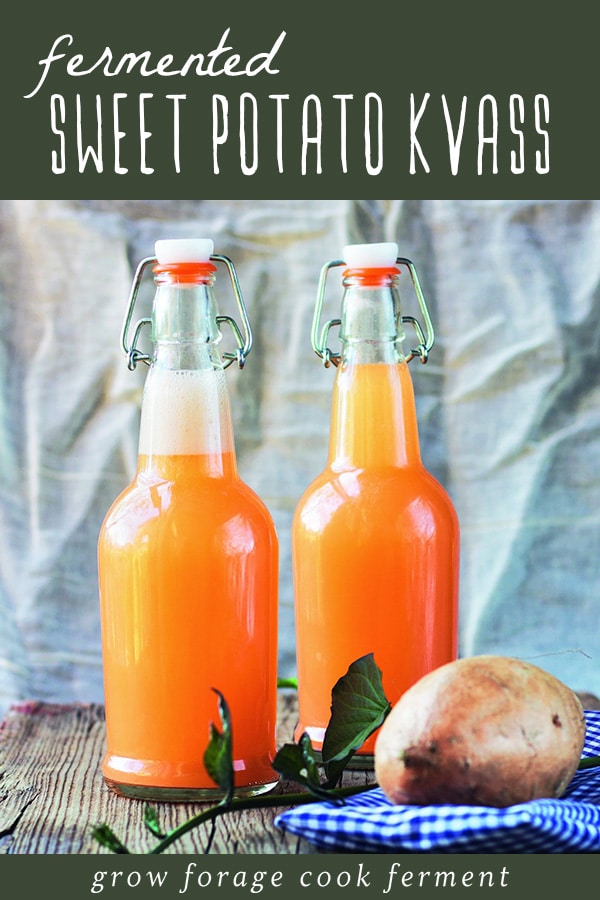
Sweet potatoes are naturally sweet (hence the name), and even though it’s not a common flavor for a soda, it actually works really well. Sweet potatoes ferment very easily, and I had a super bubbly probiotic soda in no time with this sweet potato kvass recipe!
Fermented Sweet Potato Kvass Recipe
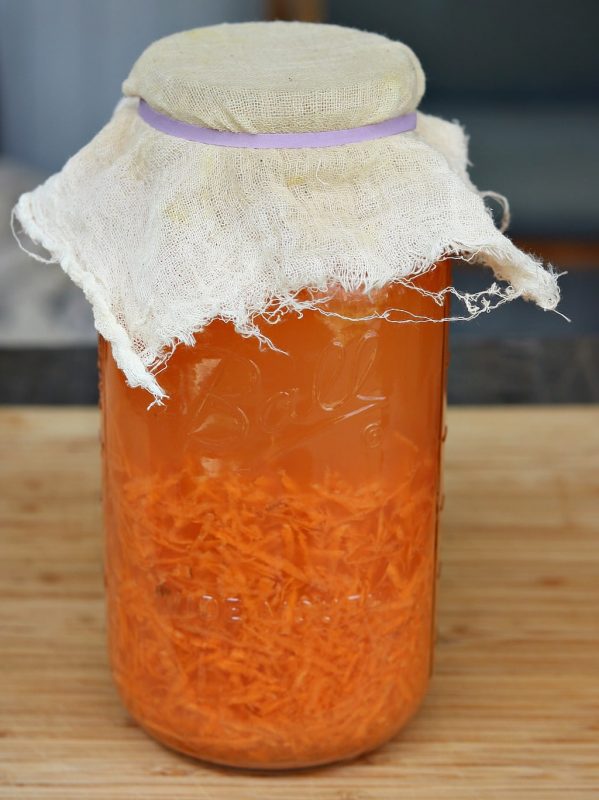


Photo credit: Shannon Stonger
I love this sweet potato kvass recipe so much! It was incredibly easy to make, and is definitely one that I’m going to keep in rotation around here.
I highly recommend Shannon Stronger’s book Traditionally Fermented Foods. It has a lot of old fashioned fermented food recipes, which I love! It covers fermented vegetables, grains, dairy, beverages, and condiments. I am especially impressed with the number of sourdough recipes in this book, including gluten free sourdough recipes!
What is your favorite naturally fermented soda? Have you ever tried sweet potato kvass or sweet potato fly?
Naturally Fermented Soda Recipes
Here are some more naturally fermented soda recipes for you to try.
- Strawberry Rhubarb Soda
- Fermented Root Beer
- Fermented Elderberry Soda
- Elderberry Soda
- Turmeric Soda
- Kefir Soda
- Winter Herb Kvass
Sweet Potato Kvass (Sweet Potato Fly)
Ingredients
- 2 cups shredded sweet potatoes (1 medium) 360 g
- ¾ cup sugar 144 g
- Water as needed
Instructions
- Combine the shredded sweet potato and sugar in a half-gallon (2-L) vessel. Fill the rest of the vessel with water, leaving 1 inch (25 mm) of headspace. Cover with a permeable lid such as a coffee filter or clean cloth secured with a rubber band or canning ring.
- Set at room temperature to ferment for 3 to 5 days or until it is bubbly and beginning to get tangy. During this time, yeast may accumulate on the surface of the ferment. If it does, you can simply scoop it out. It will abate during the second fermentation.
- Once the initial fermentation is underway, strain the sweet potato from the kvass and transfer the liquid to airtight bottles, leaving a bit of headspace, because the carbonation should be strong. Once bottled, leave to ferment at room temperature for at least 2 to 4 days, or until the beverage has a bit of tang and is carbonated.
- Consume within a few days if storing at room temperature. Or, refrigerate for 1 to 2 weeks, checking the carbonation frequently to avoid the buildup of too much pressure.
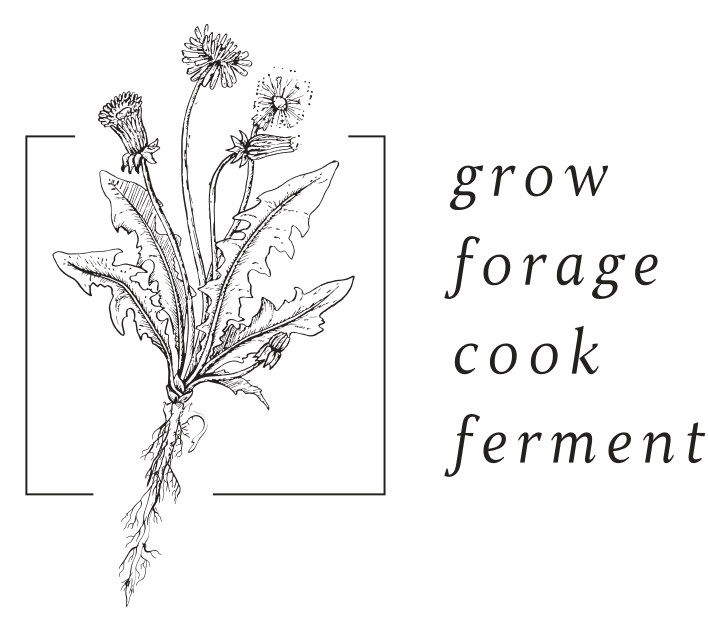
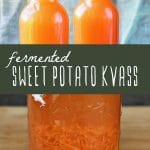

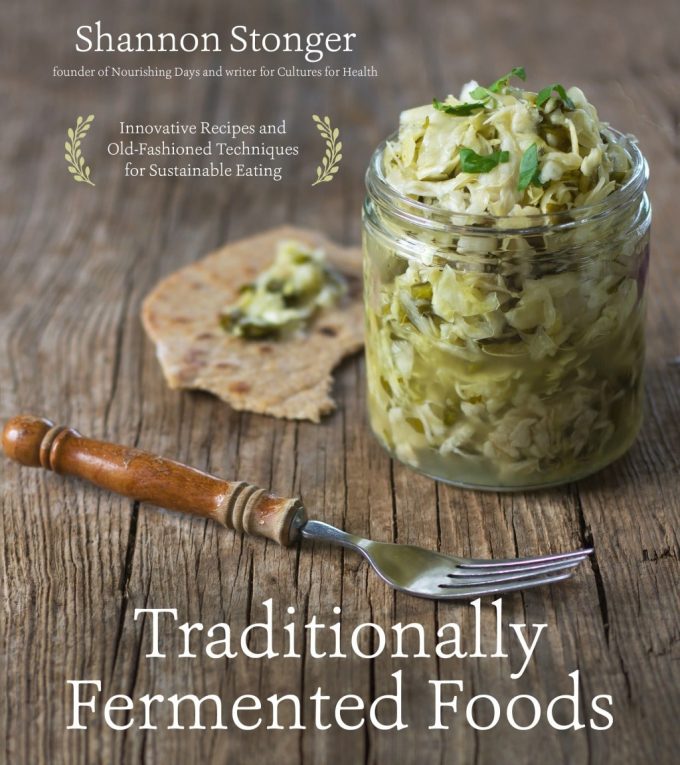
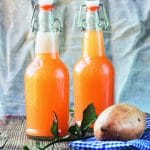

Hello! So excited to try this and other fermented sodas after growing my first ginger bug. One general question – after bottling, do the bottles have to be burped while they are undergoing the second fermentation?
Thanks!
Yes, you can burp the bottles during second fermentation if you plan on letting them go longer than a few days. If so, I would burp every day or every few days depending on how active your ferment seems to be.
Is it ok for children to drink these fermented beverages; what is the alcohol content? And, how do they affect blood sugar in diabetics?
This recipe is safe for children, however, it does contain a negligible amount of alcohol (similar to kombucha). You’ll need to use a hydrometer to find a precise ABV in your fermented drinks. I’m not sure how fermented drinks affect blood sugar in diabetics. You’ll need to do your own research on that.
I have made this recipe several times. The first time it came out fantastic. The second three times, I ended up with mold around the top. I have no idea why – I am using cheesecloth to cover the jar. I ferment veggies and make jun and regular kombucha all the time and this has never happened to me except in this one instance. Any ideas would be very much appreciated.
lacto-fermentation requires anaerobic environment. aka for this u must cap it to prevent oxygen from flowing in.
on the other hand, acetic acid (vinegar) fermentation requires air. thus kombucha fermenting you should not cap it.
here though, u want to loosely cap it so pressure can flow out but nothing flows in.
another way to prevent surface ‘mold’ from forming is to weigh all solids down, keeping them underwater
I’m so excited to try these fermented sodas out. I’ve been replacing most of my sugar with honey, and am wondering if you have tried any of the sodas with honey instead of sugar?
Hello! I was so excited to try this! My batch is on day three and it’s a little slimy. Is that supposed to happen? Help?
Definitely a nice recipe. I would caution that the greater the carbonation the greater the alcohol. Yeast produce equal amounts of carbonation and alcohol. Lactobacillus good bacteria will ferment with no to low alcohol (and low carbonation if any). Unlike Kombucha – an acetic acid bacteria ferment which converts any alcohol produced by any yeasts to acetic acid (vinegar) and gluconic acid (pleasant & healthy) – when fermented in the open. (covered with cloth). All these yeast and bacteria are present in the air – or on the veggies themselves. It’s best to clean the veggies to avoid soil contaminants.
This looks like a definite try!!
I made this and am really pleased. I added some fresh turmeric and ginger root, a star anise and some lime zest. It’s delicious. I have a condition that means my bile duct gets blocked frequently and it causes pancreatitis. This has helped enormously as I’m allergic ibuprofen, I can’t take anti inflammatory drugs so this has really helped. Can I use, raw organic honey instead of sugar?.
You don’t need to add any sugar. Keep cooler (60’sF) will take longer. Will not be as sweet nor as carbonated. Pinch of sea salt to avoid molds. But this is more along the line of fermented foods than a pleasant drink. You could add the water prior o drinking.
I saw tiny bubbles on the second day but now i see nothing. I wonder if it is dead. I have stirred 2x a day.
Toady is considering the 4th day when I started. Actually I can see lots of starch.Tasted it kind of sour the smell is sour.
I am living in a tropical climate average temperature is 27 – 32 celsius.
Hi Colleen,
Great to know you can produce kvass from sweet potato !
With kombucha, I produce the beverage, and also an excellent vinegar ( letting the beverage mature a long time with air in the botle )
Is it possible to do the same with this potato kvass?
Would you have a receipe of fig vinegar ?
Sorry for my poor english !
@+
Pierre
Ps : congratulation for your web site !
It was a bit strong for me, almost like sipping wine. I’m not a fan, but was fun to try. I use it now as a fly trap, pouring little in a vessel in my garden and it works like a charm.
This looks delightfully refreshing! Do you peel the sweet potatoes before shedding them, or leave the skin on?
I did not peel them, no. The peel is where a lot of the good bacteria is… and choosing organic is probably best.
This looks great! I’ve never tried something like this before. I don’t usually like sweet potatoes, but I think this could maybe bring me back into the fold for sweet potatoes! How long does this last? Thank you!
Do you discard the sweet potatoes or can you use them for more than one batch?
I composted them. You could probably do a second batch, but it will likely be much weaker in flavor.
You didn’t mention rinsing the starch off the potatoes after shredding, like every other recipe I read after I made it did. Mine is cloudy and not at all orange like the picture.
The original recipe that I followed from the book did not call for rinsing off the starch. In fact, the starch probably aids in the fermentation process. My batch did not turn out cloudy at all, and had a wonderful flavor :)
This. Sounds. Amazing.